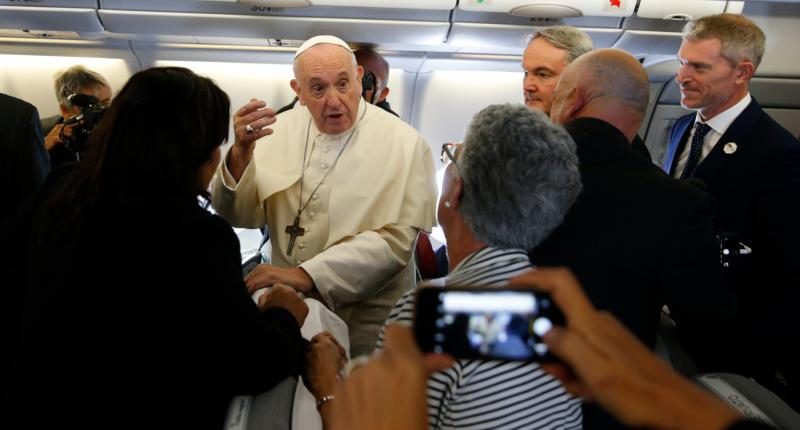VATICAN CITY — With fake news becoming ever more sophisticated, people need the wisdom, courage and patience to discern and embrace constructive stories, Pope Francis said.
“We need stories that reveal who we truly are, also in the untold heroism of everyday life,” Pope Francis wrote in his message for World Communications Day 2020.
World Communications Day will be celebrated May 24 at the Vatican and in most dioceses. The papal message was released at the Vatican Jan. 24, the feast of St. Francis de Sales, patron saint of journalists.
[hotblock]
The message for 2020 was based on the theme, “‘That you may tell your children and grandchildren’: Life becomes history.” The passage, drawn from the Book of Exodus, highlights the importance of sharing “knowledge of the Lord” and meaningful memories, stories and experiences, so that they may transform people’s lives, he wrote.
Jesus, who is “the quintessential storyteller — the Word,” he said in the message, spoke of God “not with abstract concepts, but with parables, brief stories taken from everyday life” so that “the story becomes part of the life of those who listen to it, and it changes them.”
“God has become personally woven into our humanity, and so has given us a new way of weaving our stories,” he said.
“Stories influence our lives, whether in the form of fairy tales, novels, films, songs, news, even if we do not always realize it,” he said, and people often decide “what is right or wrong based on characters and stories we have made our own.”
So many stories throughout history share a common “thread” in which heroes, including everyday heroes, follow a dream and “confront difficult situations and combat evil, driven by a force that makes them courageous — the force of love,” the pope said.
[tower]
These kinds of stories can give people both the example and reasons “to heroically face the challenges of life,” to grow, be enriched and to discover themselves better.
However, the pope warned, “our story has been threatened” by the temptation of evil that entices with false promises and uses the power of storytelling “for purposes of exploitation.”
“How many stories serve to lull us, convincing us that to be happy we continually need to gain, possess and consume. We may not even realize how greedy we have become for chatter and gossip, or how much violence and falsehood we are consuming,” he said.
“Instead of constructive stories, which serve to strengthen social ties and the cultural fabric,” he said, “we find destructive and provocative stories that wear down and break the fragile threads binding us together as a society.”
Such stories, he said, piece together scraps of “unverified information,” repeat “banal and deceptively persuasive arguments” and send out “strident and hateful messages,” which serve only to strip others of their dignity.
At a time “when falsification is increasingly sophisticated, reaching exponential levels — as in deep fake — we need wisdom to be able to welcome and create beautiful, true and good stories,” Pope Francis wrote. “We need courage to reject false and evil stories. We need patience and discernment to rediscover stories that help us not to lose the thread amid today’s many troubles. We need stories that reveal who we truly are, also in the untold heroism of everyday life.”
A good story stands the test of time, too, because it nourishes and renews life.
The Scriptures and the stories of the saints are just some of those good stories, he said. As they always “shed light on the human heart and its beauty, the Holy Spirit is free to write in our hearts, reviving our memory of what we are in God’s eyes.”
“When we remember the love that created and saved us, when we make love a part of our daily stories, when we weave the tapestry of our days with mercy, we are turning another page,” the pope wrote. “We no longer remain tied to regrets and sadness, bound to an unhealthy memory that burdens our hearts.”
With God, “we can reweave the fabric of life, darning its rips and tears,” and realize that “no one is an extra on the world stage, and everyone’s story is open to possible change,” he said.
“Even when we tell of evil, we can learn to leave room for redemption; in the midst of evil, we can also recognize the working of goodness and give it space,” he said.
The pope encouraged people to ask Mary to “teach us to recognize the good thread that runs through history” and to loosen “the tangled knots in our life that paralyze our memory.”
He prayed that she would inspire trust in people and “help us build stories of peace, stories that point to the future. And show us the way to live them together.”
PREVIOUS: Priest appeals for more shelters for volcano evacuees in Philippines
NEXT: New martyrs include religious priests, 20th century laity




Share this story